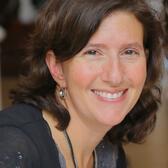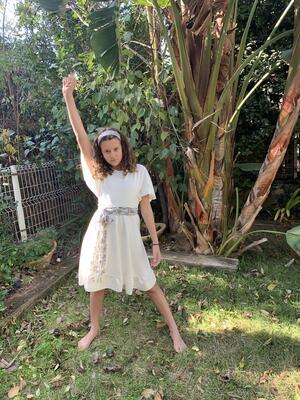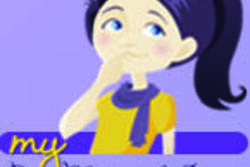Lessons from Our Backyard Bat Mitzvah
My daughter Rakia hurtled into the world nine minutes after we arrived at the hospital, and before she had a name, she had a bat mitzvah date. One of the first things my husband did after making a few phone calls was look ahead at the Jewish calendar—because that’s what you do when you’re a Jewish educator and a cantor’s son who began tutoring bar/bat mitzvah kids at age ten. “January 16, 2021,” he informed me, “Parshat Vaera.”
Rakia’s love of music and acting was clear from an early age. As a baby, she swayed and bobbed to any tune. As a toddler, she sang lyrics after hearing them once, a sponge for melodies. At three, she picked up the trope notes for chanting from the Torah as her two oldest siblings studied for their b’nei mitzvah, and by first grade, when her next sibling was practicing his portion, she’d learned the first few verses of her own. To this day, we’re treated to amazing concerts when she’s in the shower. She has big dreams of Hollywood or Broadway.
Fast forward to 2020. Our budding actress was preparing to perform in her first play at the end of March: The Wizard of Oz, put on by a local women’s theater group, in which she was to be a munchkin and a flying monkey. Canceled. We held onto faint hopes that summer camp would open, that we’d attend my nephew’s bar mitzvah in Chicago in December. Our parents and siblings, we knew, would be unable to travel to Israel for Rakia’s bat mitzvah. Our kids are resilient, and took each disappointment—no play, no camp, no trip to the US—with aplomb.
Our small backyard is adjacent to two others, and both sets of neighbors are American-Israelis, who, like us, have no close family in the country. We attend the same partnership minyan in central Modiin. During the first lockdown, we stood in our backyards every Friday night, sometimes calling on the older, no longer observant kids to make a minyan of ten adults. In the early days of the pandemic, the services felt like a lifeline, the highlight of my week; I’d never prayed with greater intention. Once regulations allowed, our minyan moved to the park across the street and others joined. Rakia attends each week, and at some point, runs off to play with the neighborhood kids of varying ages, who became her lifeline. Like her name, which comes from Genesis and means expanse of the sky, the heavens, Rakia has a sunny disposition, a joie de vivre with an infectious giggle. Younger kids often follow her like she’s the Pied Piper.
In June, we resumed the fifteen-minute walk on Shabbat mornings to our regular shul, which meets in an elementary school with ample outdoor space. Each week, our heroic gabbaim orchestrated three different services, 20 people per capsule. As the months crept toward the bat mitzvah in January 2021, we hoped to combine two capsules and invite 40 guests. We planned a separate Thursday morning minyan in the park for 20 different friends and prayed for decent weather.
Rakia continued to practice. Like her older siblings, she would read the entire parsha. She would use the family Torah. Written in Frankfurt in the 1890s, the Torah survived two world wars, eventually came to the United States, and upon my father-in-law’s retirement from his congregation, we brought it to Israel, where it now resides in our minyan. At Rakia’s baby naming, we dedicated a new parochet, a deep mauve Torah cover embroidered with a harp in memory of my husband’s grandmother, who also loved music, and for whom Rakia Charlotta is named.
For the two weeks leading up to January 16, we refreshed the iffy forecast daily. But the bigger problem was COVID. The government had announced a third lockdown in late December, and despite the massive vaccine drive, the numbers in Israel were at an all-time high. On January 6, new, tighter restrictions were announced: Ten people per capsule for outdoor gatherings. We canceled Thursday morning and switched Shabbat services to our garden, inviting a handful of friends to the three backyards.
My oldest, who served in the Homefront Command during his IDF service, has been doing reserve duty almost every night since July. Coming and going between his base and home, he posed our biggest risk, and sure enough, COVID chose that week to go around his base. Three days before the bat mitzvah, he started experiencing mild symptoms, and by Thursday afternoon, he’d tested positive.
Rakia despaired for about 20 minutes, mostly because we were now in quarantine and she wouldn’t be able to play in the park. We rushed to be tested, and my older daughter, arriving home from the army after being away for a month, went to stay in our neighbor’s empty Airbnb. We rejuggled the guests so we’d be alone in our garden.
Friday morning, as we obsessively checked our test results and waited for the rain to stop, friends began dropping off flowers, balloons, and baked goods. Rakia spun around the living room, balloons in hand, singing “I love my bat mitzvah.” No plans gone awry, no rain, no sibling with mild COVID could tamp her delight.
I packed a take-home kiddush of cupcakes, a bencher, and a candy-filled mug with a picture of Rakia superimposed on the Hamilton logo, our latest obsession. And finally, 20 minutes before Shabbat, the skies cleared, and our test results came in. Rakia, my other son, my husband, and I were all negative. I hung a few hasty decorations, and lit candles with a huge sense of relief.
Shabbat morning the ground was damp, and wet leaves dotted the garden. The table with the Torah stood in the spot with the best view from our neighbors’ yards. Once we were outside, we allowed our son to run through the house, double-masked, without touching anything, and out to a balcony to watch from afar.
We are blessed with several musical friends who daven with spirit, and the sound of our prayers echoed through the neighborhood. Rakia shined. She led the Torah service and read each aliyah like a pro, though later she admitted that she was “very, very nervous. But also very happy.” When Rakia finished the haftorah, we threw candy and sang. Her joy—and ours—was contagious. We could feel the smiles of our tiny community through their masks and across the fences, a buzz of delight in the air. Our elation trumped the virus. After the service, everyone lingered in the respective backyards. Rakia hung out on our steps, chatting with her friends from a distance, giving out the balloons she’d gotten the day before.
In Parshat Vaera, the Israelites’ spirits have been crushed, they are unable to listen to Moshe when he tells them God will deliver them from slavery. After ten months of our current plague, we, like the Israelites in the parsha, couldn’t have imagined that a tiny backyard ceremony in the midst of COVID would cause our hearts to exult, but it did. In Israel, we greet people at weddings and b’nai mitzvah by saying “Mazal tov” to anyone in attendance, not only to the immediate family members. Witnessing others’ happiness is reason to rejoice in itself. It’s a chance to leave the mundane behind and recenter ourselves, to lift the main celebrants and be lifted in turn.
As the pandemic recedes, we are planning a second bat mitzvah with our larger shul community in June—Rakia is learning new Torah readings, a new Haftorah. And why not? We should celebrate when we can, to cup these moments of joy in our hands and drink them up.









What a lovely combination of the Jewish joy of celebration and our Covid lives! Bravo!
Your positivity is amazing. Knowing Rakia’s father and his parents, and your family, and Oma, I can see where she gets her drive. Hopefully, she never looses her upbeat personality
No matter how many times I read this it makes me smile and feel grateful.......grateful for Rakia, grateful for her wonderful family AND grateful for how talented her mother is to help us vividly share this special time through Julie’s writing.
We’re also grateful to JWA for their wisdom in printing the story for so many to share.
LSK aka OMA
What a magnificent, glorious story about whom I'm guessing is a magnificent, glorious young woman. I only wish I could have said Mazal tov in person.
Sent with all my love,
Uncle Allan
Beautifully written Julie. Your story was inspiring- especially for me since my first born grandson will be celebrating his bar mitzvah next weekend while we are stuck in Tulsa waiting for medical results for Michael.
We will zoom in with pride & gratitude for modern technology!
Mazel tov to the Zuckerman & Kulp families! Xo
Julie....how blessed I am, our resident writer, par excellence‼️🇮🇱🇺🇸 I sign most correspondence to Julie with both symbols of an Israeli flag 🇮🇱 and an American 🇺🇸 one.
With good reason - lour four Israeli grandchildren have the very best of their parents and their deep roots. We gave them their roots and continue to cheer their wings. 🇮🇱🇺🇸🇮🇱🇺🇸
Thank you both Julie and Josh. And to Rakia Charlotta we say, MAZEL TOV.